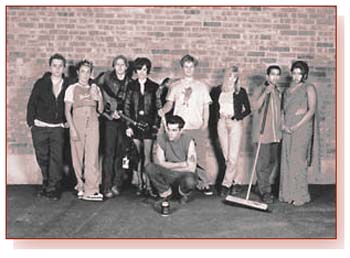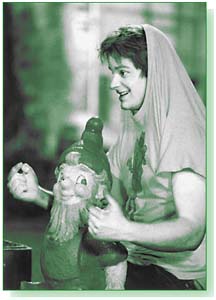![[Metroactive Movies]](/movies/gifs/movies468.gif)
![[Metroactive Movies]](/movies/gifs/movies468.gif)
[ Movies Index | Metro | Metroactive Central | Archives ]
Waiting for the Sun
Nightwalkers: Richard Linklater's aimless, sleepless suburbanites gather together long enough for a group shot.
Monologist Eric Bogosian's angry complaints war with 'subUrbia' director Richard Linklater's laid-back, before-dawn style
By Richard von Busack
THE HOURS between midnight and dawn are dream time--such a natural territory for movies that it's surprising that even more haven't taken place in that nocturnal zone. All four of Richard Linklater's films--Slacker (1991), Dazed and Confused (1993), Before Sunrise (1995) and the new subUrbia--seem to occur at 2am.
Three of his four films are about "white nights," as Dostoevski titled one of his stories. It's a phrase that means a sleepless night, such as the ones in St. Petersburg during which the Russian novelist's hero wanders the streets in a reverie. (It could also refer to the midnight sun of far northern cities.)
Even when they're abroad in daylight, Link-later's characters are in reveries: drunk, stoned, dreamy with romance and fantasies. The director's movies are full of the sense of what it's like to walk down a safe, empty street at 4am, the only soul awake for miles. When you are young, such an hour means having nostalgia for the way you feel, even as you feel it.
Linklater's movies are like good parties. You go, hear tall tales, ponder great music, watch lovable self-aggrandizing fools, leave for a walk to the convenience store for more beer and smokes, flirt irresolutely with someone and eventually leave packed into a car with a gang of friends.
His first feature was Slacker, in which the plot is passed hand to hand like a baton among various groups of idle students and hangers-on telling their stories to each other. Dazed and Confused, similarly structured, matchlessly evokes high-school life in the mid-1970s. Before Sunrise is a tender all-night walk through the streets of Prague--the ghosts of a city's bad history dispelled by the pleasure of a young couple exploring it.
Younger directors are mad for sharp editing; it's the mark of television watched and reproduced. Linklater prefers a sort of directorial ellipsis ... in which music overlaps the loosely jointed scenes. Fortunately, Linklater has one of the best pairs of ears in the movies today, and his apt choice of new music (or of the people who do this job for him) completes the circuits in his films, making a rapturous mood out of tentative connections and unfinished sentences.
Linklater knows everything that needs to be known about making a youth movie. Not one plot, but a bundle of subplots, mirrors the young person's sense of constantly shifting identity and perspectives.
He also understands how to make emotional intensity in the young not look ridiculous. It's a trick he pulls off through humor, pacing and the casting of unfamiliar young actors so that audiences don't remember the last time that particular performer had a fit just like the one they're watching now.
Above all, Linklater is a serene moviemaker. He possesses enough distance to keep the troubles of late adolescence and early youth at arm's length. He's made Gen X inarticulateness seem eloquent; he makes it almost sensible to have nothing to say and not enough energy to say it even if you did.
Since he works in Texas, Link-later handles horizontal space well--the road going on forever and the party never ending, as that song by Austin's Robert Earl Keen Jr. goes. That endless space creates a feeling of forward thrust at the end of Linklater's movies, with trains leaving and cars speeding off. In the last scenes in Slacker, the camera races after a swimming party, and it's almost as if the film had run out of breath. All of Linklater's movies are capped by escapes.
In subUrbia, however, the journey spins out. The final escape is a crane shot, the camera levitating about 50 feet to show us a hung-over dawn, an inescapable maze of roofs and ventilation ducts. It's his most earthbound movie.
Photo by Deana Newcomb
Town Without Pity
AT THE beginning, Linklater shows us the street-level view of this maze, fading in and out of various scenes of strip malls and bland development (to the music of Gene Pitney's melodramatic "Town Without Pity").
In a slow tracking shot that's like the pitching of a bowling ball, the camera finally swoops down into the tract-house garage where Jeff (Giovanni Ribisi) has pitched a small tent full of food, books and a cellular phone. It's the closest he can get to leaving home.
After this prelude, the movie starts in earnest. subUrbia takes place from about 9 at night until dawn in the parking lot of a convenience store in a town called Burnfield in an unnamed state. Some young people in their late teens and early 20s are drinking, after having been left out of the night's big concert because they couldn't get tickets.
Newly minted rock star Pony (Jayce Bartok) is playing to a sold-out house. Pony used to be one of the crowd, but within the last year, he's gone from the stage of the high-school gym to MTV. He had called Jeff earlier, promising to stop by the corner and say hello.
The knot of young people waiting for Pony includes the team of Buff (Steve Zahn), a crude, harmless joker, and Tim (Nicky Katt of Dazed and Confused), a bitter and perhaps crazy exAir Force enlistee, soaking up his disability checks with alcohol.
Sooze (Amie Carey) is an eccentric girl with dreams of going to New York to be a performance artist. She's ready to shed her boyfriend, Jeff, who's anchoring her to Burnfield, working a part-time factory job and going to a community college.
Presently, the limousine arrives, bearing the semitalented but good-looking Pony, along with his publicist, Erica (Parker Posey of Party Girl). Pony, metaphorical horse of a different color that he is, catalyzes all of the frustrations of the group, their dreams of fame and escape.
Sooze is the most restless; she's already mad because Jeff ridicules her performance art, though we sympathize with him, having witnessed her roundly terrible "Burger Manifesto No. 1," an anti-patriarchal rant. Sooze is ready to listen to Pony's possibly empty praise, and perhaps empty promises of letting her do the cover art for his next album.
Jeff's jealousy is compounded because he used to play music with Pony before Pony got the label and the limo. Trying to explain that his life isn't as glamorous as it looks, Pony says, "Airport, hotel, show" (as in, "I get up, I go to work, I come home"), and he attempts to make peace by bringing out his guitar and demonstrating the kind of shoelace-gazing songs he's writing. One is called "The Man Invisible" and includes lines like "I burned my hand in a fire / I haven't slept for a week."
The film is based on a play by Eric Bogosian, the thoroughly overrated New York actor and performance artist who wrote Talk Radio. As adapted by Linklater, the scenes are extremely funny in small portions.
Dina Spybey, a minor character named Bee-Bee, gives an intense and effective account of her time in a drug-rehab center. Buff, a good clown in the Jughead role essential to ensemble youth comedies, shouts out what the others are too polite to say. Everyone else in the parking lot is interested in Pony's struggles as an artist; Buff is rabid to hear about how much ass the new rock star is getting.
But when a monologist turns playwright, look out. Here, it's as if Bogosian had cloned his one narrative voice into a lot of little Bogosians all ranting in tandem. Bogosian doesn't realize what an ambitious title subUrbia is for a movie. He's carved out more territory than he can encompass.
One hears so much nonsense between midnight and dawn, but Linklater is forgiving about it--usually. Linklater's dreamy acceptance of people's various points of view is the essence of the charm of his films (like the speech in Dazed and Confused about how the '80s are going to rule, since the '70s sucked so badly).
Bogosian, an angrier artist, harbors contempt for the suburban rubes he's writing about. Bogosian's work isn't about what it's like to be in the suburbs all night drinking and blowing smoke; it's really about all of the show-biz jackals and suburban artist wannabes who are elbowing him at the market in Manhattan. "Airport, hotel, show"--Bogosian has a lot to complain about.
At its worse, the script for subUrbia smells like old auditoriums. Take the bit, please, in which the drunken outsider Tim, mad, bad and dangerous, wins Erica by dressing her down as a rich privileged poppa's girl from Beverly Hills. ("Bel Air," she obediently corrects him.)
The girl takes the bait, saying, "You know everything about me, but I don't know anything at all about you." As that Carol Kane line goes in Annie Hall, it's such a pleasure being reduced to a cultural stereotype. (One had hoped that Posey, with her testicle-curdling snarl, had been born to make this kind of scene extinct.) Bogosian confers that pleasure of reduction on several of his characters--including a hen-pecked 7-Eleven owner and a Chinese waitress.
Script vs. Director
AT THE END of subUrbia, Bogosian's script starts to make what happens on this night outside the convenience store a matter of life and death. Here, the scriptwriter dons as much ill-fitting self-importance as Pony wears.
It is at this point that subUrbia really outwears its welcome. This is Linklater's first film with a potential death in it, if you don't count the references to the assassination of JFK in Slacker. Bogosian tries to make his trifle chewy with the threat of violence; by the time guns are produced, the desperation doesn't seem to belong to the characters as much as to the writer.
Linklater, in contrast, is best when he's doing least. He usually doesn't try to ground his films in anything. The suburbs he shows us are here and gone; his movies say, You can't go home again, and good riddance.
Bogosian, at the other end of the road, is gesticulating about New York poseurs and sharks. He makes subUrbia a malapropic New York version of the bartender's last call: You can't go home, but you can't stay here. He's a roadblock to Linklater, who's a natural road-movie artist.
The lightness and comedy of most of the scenes--the unsaid bubbling up as clear as if it had been said; a drunken limo ride, with Buff hanging out with his new drinking buddy, a stolen garden gnome--are more memorable than the bogus(ian) resolutions. But Bogosian's erstwhile seriousness can't hold this dreamlike movie down. Linklater's free-form ebullience, for the most part, overcomes the writing.
I was overcome myself by one of Linklater's almost tossed-off moments: a depressed girl, alone by the wall of the convenience store at 3am, is mesmerized by her own shadow and by the sound of a Sonic Youth song playing on her small portable tape deck. If you killed every other Gen X director in America, it wouldn't be as big a tragedy as if something happened to Richard Linklater.
[ Metro | Metroactive Central | Archives ]
This page was designed and created by the Boulevards team.

Deana Newcomb
You Can't Go Gnome Again: Buff (Steve Zahn) bonds with his newest drinking buddy.
subUrbia (R; 118 min.), directed by Richard Linklater, written by Eric Bogosian, photographed by Lee Daniel and starring Parker Posey, Jayce Bartok and Giovanni Ribisi.
From the February 13-19, 1997 issue of Metro